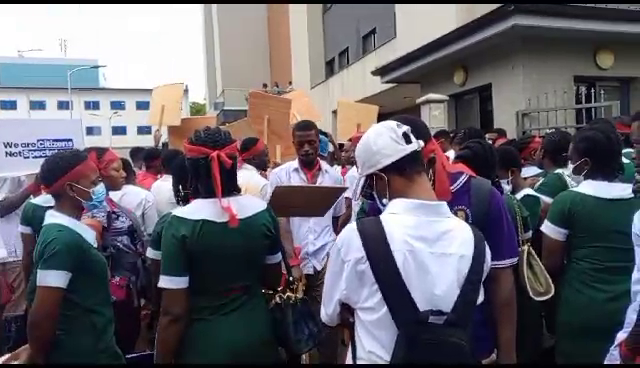The nationwide strike by the Ghana Registered Nurses and Midwives Association (GRNMA) remains unresolved after an emergency meeting with the Ministry of Health failed to produce a breakthrough.
On Monday, June 9, leaders of the GRNMA met with the Ministry and other major stakeholders behind closed doors in a bid to end the impasse, which has severely impacted healthcare delivery across the country. The meeting focused on the union’s demands for improved conditions of service.
After the discussions, the Vice President of GRNMA, Samuel Akoto Alagkora, addressed the media and revealed that the government had blamed budgetary constraints for its inability to meet the association’s demands.
“We were told that there was no budget provision for it, and these conditions of service were presented to the government in January, and we expected that they would be factored into this year’s budget. Unfortunately, we are being told that the challenges of the implementation are such that they have budget constraints,” he explained.
Alagkora disclosed that the government had proposed postponing the implementation of the negotiated conditions of service to 2026—an option the union considers unacceptable.
“And what they wanted us to agree on was to push the implementation to 2026. What it means is that they wanted to set the conditions of the service calendar so that it will be like we have just renegotiated, and then we are moving on, so that the idea of arrears will not come in. This is not fair,” he said.
The GRNMA’s National Council is expected to review the proposal and determine the association’s next line of action, but for now, the strike continues, leaving many public hospitals short-staffed and patients without adequate care.
Meanwhile, the Ministry of Health insists it remains committed to dialogue. Spokesperson Tony Goodman emphasized the Ministry’s willingness to consider feedback and revise its position if necessary.
“We are open to any proposals they may also come back with. We are open to any discussion. We are not saying that whatever position we have is what they should take. They may also have their own position. We will look at it and see if necessary, we will adjust. That is what negotiation is about,” he said.
The standoff underscores growing tensions between the government and healthcare workers over the fulfillment of longstanding commitments, with no immediate resolution in sight.


